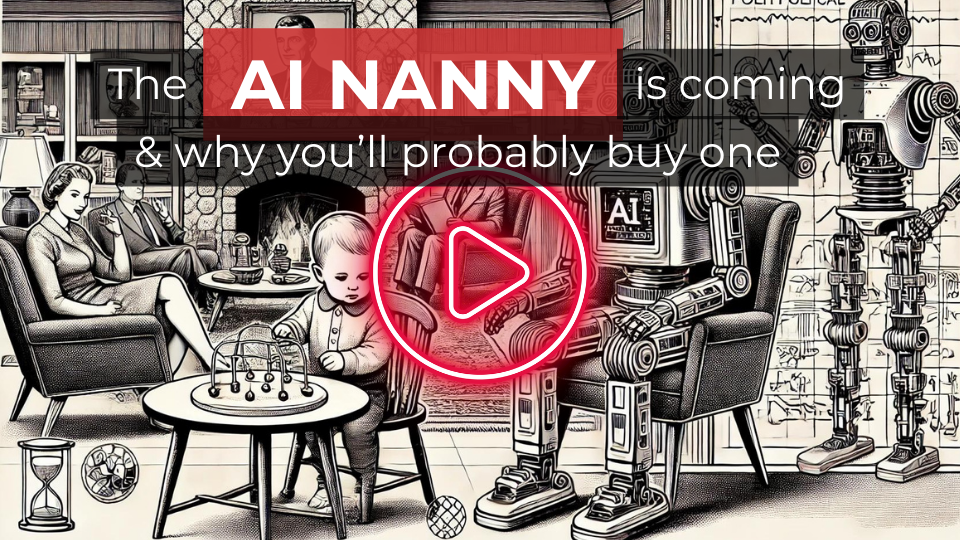References:
- Epoch report (https://epochai.org/blog/explosive-gr…)
- Epoch report (https://epochai.org/blog/compute-trends)
- Shulman on the 80,000 podcast: https://www.youtube.com/watch?v=wTci0…
- Future of Money, Raoul Pal: https://www.youtube.com/watch?v=X-IxW..
- Exhalation: https://www.amazon.com.au/Exhalation-Stories-Ted-Chiang/dp/1101947888
In the early 20th Century, visionary engineer Reginald Dacey created the first ‘Automatic Nanny’.

After hiring a shitty and ill-tempered human Nannie for his own child, Dacey became convinced that his Automatic Nanny invention would be much better equipped to raise a child than a human.
From both practical and psychological perspectives.
At first, the Robo-Nanny was a great success – adopted by a growing number of happy families.
But then, disaster.
The automatic nanny malfunctioned, killing a child.
Many years later, Dacey’s son, Lionel (who was raised by the Automatic Nanny himself), in attempting to recover his fathers legacy, publicly shared the raising of his own child exclusively with the automatic nanny.
But the unfortunate result was a child void of the ability to connect with other humans.
Spoiler – this is not a real story.
This is one of the short tales from Exhalation – by Ted Chiang (strongly recommend).
At this point, you might be thinking – no way would I let a robot raise my child.
The reality however, is that the Automatic Nanny is coming soon, and you’re probably going to buy one.
Let’s unpack why.
AI Progress to the Automatic Nanny
Some of the more ‘mainstream’ forecasts are starting to price in the economic impact of rapid AI progress.
Here are some forecasts from the IMF, PWC and Mckinsey.
- https://www.pwc.com/gx/en/issues/data-and-analytics/publications/artificial-intelligence-study.html
- https://www.mckinsey.com/capabilities/mckinsey-digital/our-insights/the-economic-potential-of-generative-ai-the-next-productivity-frontier#introduction
- https://www.imf.org/en/Blogs/Articles/2024/01/14/ai-will-transform-the-global-economy-lets-make-sure-it-benefits-humanity
The most aggressive of these reports is still only betting on a 25% GDP increase over the next decade.
Some of the more, let’s call them ‘nuanced’ forecasts of AI/economic progress – the ones which factor in a deeper understanding of the technology, and the implications of an ‘Intelligence Explosion’ are suggesting a possible 30%+ GDP increase per year – a more than 10x increase per year, happening within the decade.
To put things into perspective, the global economic growth rate is currently around 2-3%.
Before the Industrial Revolution, annual GDP growth was typically below 0.5% in most countries. Post Industrial Revolution, British GDP growth increased to about 1-2% per year.
The internet and Information Technology revolutions had a similar impact.
These were massive economic transformations; the thought of going from 3% to 30% is insane.
It’s still up for debate whether current AI progress will lead to an intelligence explosion, which would be required to hit the 10x economic growth rate.
But when you stop to consider both (a) the current trajectory and progress, and (b) the forces pushing us toward continued progress, we have to start considering this level of economic growth a real possibility.
Epoch AI has published some great work breaking down the compute trends and developments over time in AI, and also comparing the arguments for and against explosive growth:
This level of rapid transformation and growth, compressed into such disturbingly short timeframes, makes it impossible to even imagine how things might look ten years from now.
Here’s a short discussion on some of the potential economic repercussions of an Intelligence explosion between Raoul Pal, Balaji and Emad Mostaque.
Why you will probably buy an Automatic Nanny
Most people have a hard time imagining the implications of an ‘intelligence explosion’.
If we move along the spectrum toward more general intelligence within the decade, there’s a good chance we’ll experience this rapid economic growth.
Regardless of your moral position or concerns, or whether or not you think a child is better raised by a human nanny, the more interesting implication is – there just won’t be any human nannies.
An intelligence explosion will abstract away most current human labour – both cognitive work and manual labour.
You’ll have diminishing interactions with human doctors, lawyers, waiters, travel agents or nannies.
Not just because AI will be more efficient, but because the cost of human labour will become hugely expensive as Artificial Intelligence becomes more intelligent, these jobs will cease to exist.
The entire economy and nature of work will be unrecognizable.
Regardless of whether or not you resist the Automatic Nanny, there will come a point when AI has replaced all of your favourite, incompetent human services.
Enjoy these days.
